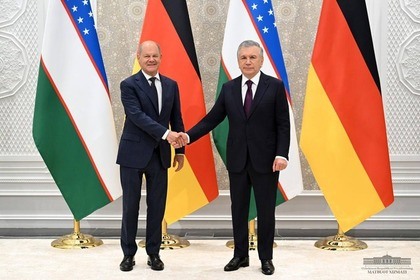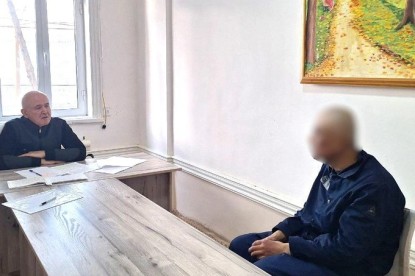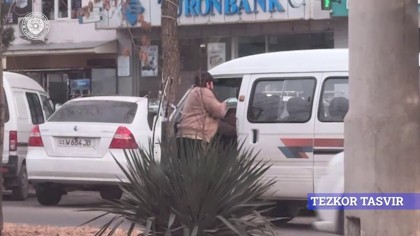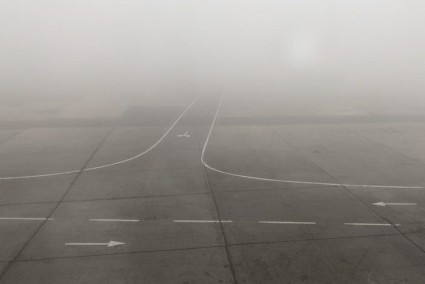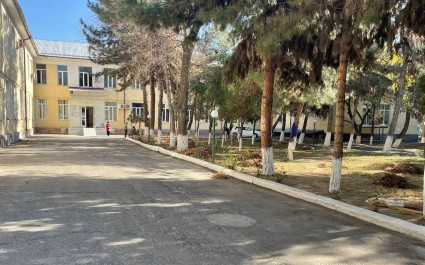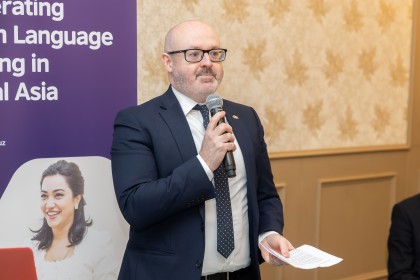The migration agreement follows the pattern of the agreements that the German Federal Government now wants to agree bit by bit with many countries in the world, said Chancellor Olaf Scholz in a statement to the press on Sunday in Samarkand, Uzbekistan.
Before the signing, Scholz had already visited the famous Registan Square in Samarkand and held a one-on-one meeting with the President Shavkat Mirziyoyev. In addition to the development of economic relations, the discussion also focused on the Russian war of aggression, said the Chancellor.
The most important points from the Chancellor's press statement in brief:
Migration agreement: The agreement on a mobility partnership regarding migration enables the "necessary immigration of highly talented workers that we need in Germany," explained Chancellor Scholz. At the same time, simple, unbureaucratic procedures are being agreed "so that those who have to go back can go back." Expanding bilateral relations: The discussion with President Mirziyoyev also focused on deepening bilateral relations. The discussion focused on where German companies and the development interests of Uzbekistan fit together well. Uzbekistan is the second largest economy in Central Asia with large reserves of natural resources.
Other topics: The joint discussions also covered the country's geographical location as a neighbour of Afghanistan, Uzbekistan's developments towards democratisation and the Russian war of aggression.
Chancellor's trip to Central Asia: Olaf Scholz will visit Central Asia for three days from 15 to 17 September: first Uzbekistan, then Kazakhstan. It is his first trip to the region as head of government. Bilateral talks will take place with the heads of state of the five countries that became independent after the collapse of the Soviet Union, the so-called Z5 (Kazakhstan, Kyrgyzstan, Tajikistan, Turkmenistan and Uzbekistan). As part of the "Z5+1" summit on Tuesday, there will also be a multilateral meeting of the group of states with Germany. A strategic regional partnership was concluded at the first Z5+1 meeting in Berlin last year. The Chancellor's trip therefore also serves to further breathe life into this regional partnership.
Chancellor Scholz: Today in Samarkand, a historical place with a long history that lies on the traditional Silk Road, I was able to speak about the further development of relations between Germany and Uzbekistan, but also the entire Central Asian region. Uzbekistan is a very important partner for us, also for the near future. That is why it was important that we were able to discuss bilateral relations on a large scale, including with regard to the further development of our economic relations, where there are many questions where German companies and Uzbekistan's development interests fit together well.
We have of course also signed many agreements. I would like to highlight one agreement here, namely an agreement on a mobility partnership with regard to migration. This follows the pattern of the agreements that we now want to agree bit by bit with many countries around the world. We are enabling the necessary immigration of highly talented workers that we need in Germany so that our economy can grow. At the same time, we are agreeing simple, unbureaucratic procedures so that those who have to go back can go back. This is exactly the right way to tackle a big task, and in that sense it is a small building block in a very large wall that is being built - for a good work.
We also discussed many issues that concern us in the region. Afghanistan is in Uzbekistan's neighborhood, so you can imagine that this was something that we were concerned about. Russia's war of aggression against Ukraine was also a topic. Of course, we also discussed the country's development in depth. There are developments here towards democratization that should continue, and that was also a topic of our joint discussions.
Question: Mr. Chancellor, how effective can the repatriation part of the newly concluded agreement really be with regard to Uzbeks in Germany who are required to leave the country? The number of these is relatively small and is in the low three-digit range.
You mentioned the proximity to Afghanistan. How important is this agreement in order to possibly facilitate deportations to Afghanistan via Uzbekistan?
Chancellor Scholz: First of all, this is an agreement with Uzbekistan - and that is what it is supposed to be - and it follows the pattern of bringing together two things that belong together, namely, on the one hand, the possibility of bringing talent, workers, specialists and engineers to Germany where we need them, and at the same time facilitating the repatriation process where that is in our interest.
This is not the agreement that will bring about a major change if you look at the overall scenario, but it is an agreement that follows the pattern according to which we want to agree on this bit by bit with many other countries.
Otherwise, there are of course confidential talks about cooperation in many areas.
Question: Mr. Chancellor, the circumvention of sanctions against Russia will certainly also play a role during your trip. In what form will you address this, especially in Kazakhstan and at the summit with all five Central Asian states on Tuesday, and how big do you think this problem is?
If you don't mind, a question about the start of border controls at all German borders tomorrow, Monday: You have had discussions with neighboring countries about this. Do you have the feeling that there is now a greater understanding of the German approach?
Chancellor Scholz: First of all: We are discussing the issue of sanctions with many governments in many countries around the world and that they must not be circumvented. That is a principle for us and we discuss it again and again so that we achieve good practice in the interests of the objective we are pursuing with the sanctions. In this respect, it is a task that we are pursuing and that will keep us busy for a long time to come; I am quite sure of that.
As far as the issue of comprehensive border controls at all German borders is concerned, I have begun to discuss it very carefully with the heads of government of neighboring countries and also with the President of the European Commission. Everyone knows that we are operating within the framework of European law, but are making maximum use of our options. That is also necessary. Everyone understands that the number of people coming to Germany irregularly is too high and that it is therefore in the German government's understandable interest to ensure that we get these things under control through good management of irregular migration. This also includes this new principle of carrying out such controls at all German borders.
Question: Chancellor, how exactly did you explain to your European neighbours why Germany is now taking tighter measures at its borders?
How are you ensuring here in the region with the two countries that you are visiting, who are both considered by Russia to be their direct sphere of influence вАС also by China вАС, that these countries actually get an offer from you? What is your sales pitch from Germany and from Europe?
Chancellor Scholz: First I'm discussing with all the neighbours of Germany about our new decisions to increase controls at all our borders, which is necessary because the number of irregular migrants coming to Germany is too high. So, it is very good that we succeeded with all the measures we took in the past to decrease the number of irregular migrants and to increase the number of men and women that go back to their home countries because of the measures we took. But it is also necessary that they understand that this will continue and that this will be all according to European law.
On the question of cooperation with Central Asian states: It is absolutely necessary to underline that we will continue to support these countries and that we will continue to develop the political and economic cooperation. That is a good message for them, because then it is easier for them to work on their own independence and sovereignty in the region, which is only possible if you have good partners. Germany is an important one for them.

